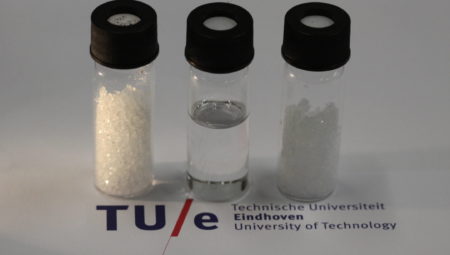Agro&Chemie spoke with Programme director Menno Knetsch about the brand-new Biobased Materials course, which started in September. Knetsch was closely involved in setting up the curriculum and the contacts with the businesses (DSM, Sabic), which participate in the Master.
‘Menno, in a nutshell, what does the Master focus on?’
‘It is a broad, two-year programme which relies on several disciplines. We go through the entire chain of polymer production, which means that biotechnology, chemistry and materials science are all reviewed. The ultimate aim is to develop applications. That is why the connection with the market is extremely important. We also involved businesses, that is, DSM and Sabic, when we set up the teaching programme. The above businesses provide coaches and supervisors who support the students. External feedback is very important to allow for adjustment in good time. Maybe students are going down dead-end paths, without being aware of the fact. People in the field can use their experience and expertise to play a guiding role in that event.’
Do the biobased materials targeted by the Master cover the entire range?
‘That’s right; first of all we examine various feedstocks – vegetable and animal – in detail, and then we jump from there to (polymer) chemicals and materials. They can be bioplastics or biopolymers. We are particularly interested in performance materials and biomedical materials. With this focus, the Master also ties in well with the areas of expertise of Maastricht University and the region’s business community. Students can also gain credits outside the Master programme at other research institutes, for instance in Liège, Aachen or Eindhoven. We don’t adhere to forced choices.’
Does the course only aim at science and technology, or does it also include skills?
‘The basic principle of the Master is problem-based and research-based learning, teaching methods with which Maastricht University also attempts to distinguish itself from other research and knowledge institutes. Knowledge acquisition in itself is only one aspect; applying this knowledge in (lesson) practice and the lessons which the students can learn from this, is another. It’s not so much about knowledge, but more about skills like communicating, linking, convincing and so on. Ideally, the students will enter multidisciplinary teams in their working life in which they form the linking factor. Another competence in which the students train is good judgement. Students assess each other’s work, something for which communication skills are essential. It is also a competence which is demanded in managerial positions.’
Are there any courses at all, in the Netherlands or somewhere else in the world, which offer a similar teaching programme?
‘As far as I know, there aren’t. There are universities and technical colleges here and abroad which offer parts of our curriculum, but no institute has everything under one roof. Let alone that this roof is at a location where the chemical and plastic manufacturers have their plants, namely at Brightlands Chemelot Campus in Sittard-Geleen. The R&D and production of multinationals and innovative SMEs are right in front of the students. That also gives the students the opportunity to see whether some might be attractive employers. Conversely, the businesses get to see rising talent.’
Speaking of talent: how many students have registered?
Due to the late accreditation, we were not able to do any recruitment. That is why we have started with six students, selected from six different countries. We aim mainly at candidates who have studied chemistry, biology, mathematics, physics or materials science at a university level. Students from universities of applied science are also eligible; one of the six students is a former Avans student. She was admitted on the basis of her outstanding study results. Whether six is not enough? In view of the short recruitment period, it is a great number. We do have to get up to a total of 25 students per year within two years, so that it is economically viable to offer the full range of the Master. We look mainly at the international market. As I said before, because our course programme has little to no competition, I expect us to obtain these numbers.’
The biobased economy has not yet reached its full potential. What kind of a chance do the Master graduates have of finding work straight away in multidisciplinary biobased project teams?
‘They have a realistic chance, but you should not expect all students to take this step at the same time. Just imagine, the first jobs of many academics in the business sector do not always result directly from their studies. There are also enough interesting jobs in the chemical and manufacturing industry which do not directly have biobased interfaces. I do expect that the students can play a part in the green chemical sector and, as biobased materials and plastics markets become more mature, that they will have more options for putting their talents to use in the transition to a biobased economy.’
‘I was particularly attracted by the multidisciplinary character of the course, says Matthew Elford. Elford, a graduate of the Maastricht Science programme, is already quite familiar with the sciences, in view of his preliminary studies. ‘The Science programme does not necessarily focus on one subject; it has a more holistic vision. That is one of the aspects which distinguishes the Master; in the biobased economy often several solution pathways are involved, with numerous disciplines intermeshing.’
Elford wrote his Bachelor thesis on new biobased building blocks, in the group of Stefaan de Wildeman (UM). ‘The material has exciting business possibilities and ideally it will result in a more sustainable world. The career perspectives are also very good; I want to get something out of it too!’



